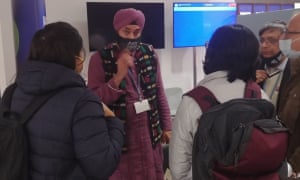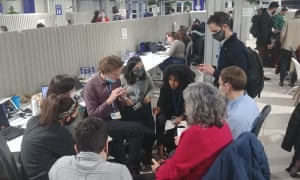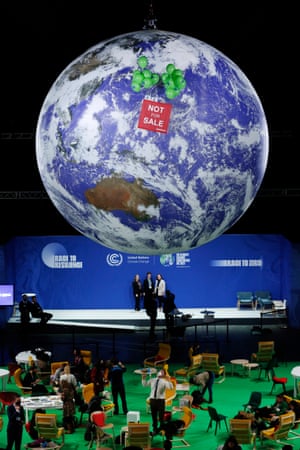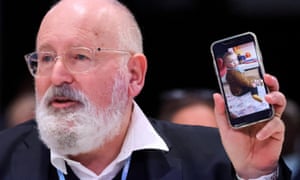
-
1.58pm EST
13:58“Loss and damage” becoming a make-or-break issue at COP26
-
1.27pm EST
13:27Australia named ‘colossal fossil’ of the climate talks
-
1.02pm EST
13:02Talks deadline passes without agreement
-
11.43am EST
11:43Rich countries are polluters not donors, say campaigners
-
11.29am EST
11:29Talks set to continue past 6pm deadline
-
10.46am EST
10:46Opposition to fossil fuels subsidies
-
9.54am EST
09:54Amazon on brink of “catastrophic potential tipping point’
2.18pm EST
14:18

Bibi van der Zee
That’s all from the liveblog today, folks. We’re waiting to hear when the text lands and will bring you the news then. It’s been a pleasure.
2.16pm EST
14:16

Chris Michael
As the negotiations stretch past the 6pm deadline and into the ineffable beyond, the remaining delegates in the SEC are developing their best thousand-yard stares.
Beige food is being consumed while standing, floor huddles abound and a lot of people are wearing coats yet not actually going anywhere.





It could be a long night.
2.13pm EST
14:13
Nina Lakhani
Human rights have been stripped or watered down from most of the Cop26 negotiations despite bold promises by world leaders at the start of the summit, according to a panel of NGO representatives.
Amid growing anger among developing nations, civil society groups and indigenous communities at the lack of progress of cutting emissions and climate finance for adaptation and loss and damage, the panelists slammed the UK for failing to ensure human rights were included meaningfully in the rules being negotiated. “The UK has been silent on human rights…. We’ve missed that progressive voice in the room,” said Deepaya Basu Ray from Climate Outreach which organised the press conference.
Obed Koringo, CARE’s civil society advocacy coordinator in Kenya, spoke passionately about the real life impacts of rich nations like the US blocking climate finance desperately needed by people like his grandmother, a peasant farmer, unable to plant crops due to prolonged drought. “More than 2m are facing starvation in Kenya… if we cannot do what’s required to address the needs of the most vulnerable, then what are we doing here?”
Koringo accused leaders from the world’s biggest polluting countries of trying to shirk their responsibilities by insisting on “slippery language”. “There’s a big difference between what wealthy countries are saying in front of the cameras and what they’re saying behind closed doors,” he said.
As the draft text on the all important Article 6 currently stands, there will still be no financing to directly help communities recover and rebuild from the climate breakdown that is causing an erosion of human rights including the loss of housing, food, land, and livelihoods. The US has been a key blocker of the loss and damage fund, according to Teresa Anderson from ActionAid.
2.07pm EST
14:07
Greenpeace managed a nice last little bit of protest – sending up balloons and a ‘Not for sale’ in front of the giant earth.
Greenpeace International Executive Director Jennifer Morgan said: “Right now this COP is yet to meet the moment. We’ve witnessed a deliberate and cynical effort by a few nations to create a charter for cheating, offsets and loopholes. Hundreds of fossil fuel lobbyists are here and their fingerprints are all over this conference. They want to buy their way out of responsibility for the climate crisis, this place is flooded with greenwash and we’re here to say our planet is not for sale.”

1.58pm EST
13:58
“Loss and damage” becoming a make-or-break issue at COP26

Damian Carrington
The issue of “loss and damage” is becoming a make-or-break issue for a deal in Glasgow as the negotiations enter Friday night. The issue is money for poor and vulnerable nations to rebuild after the now inevitable impacts of the climate crisis hit. The issue has long been controversial, with the US as a huge historical emitter fearing it will open itself to unlimited claims for damages.
“Vulnerable countries want a loss and damage facility launched here but the EU and the US have been blocking any mention of this,” said Mohammed Adow, from Power Shift Africa. “If it’s about environmental justice and providing solidarity, particularly to the climate vulnerable countries, Joe Biden’s administration is perhaps as worse as Donald Trump’s.”
Adow said a loss and damage facility would be a “delivery vehicle” for funds to be raised in future, and was clearly supported in the negotiations by 130 nations, representing 85% of the world’s population. “But rather than reflecting where the majority of the world was on a loss and damage facility, [UK COP26 president Alok Sharma] chose to reflect the position of the [rich nations] in the [draft text] they put out this morning.”
“If [Sharma] want us to leave Glasgow, with a good outcome, and without undermining the multilateral process, then he needs the need to reflect where the majority stand on issues,” Adow said.
Alden Meyer, at the think tank e3g and a COP veteran, said: “This is a particularly cliffhanger moment in this process. There has been a drama between the US and the small island states and others around the issue of loss and damage.”
“The people on the frontlines of suffering loss and damage are not the ones that caused the problem,” he said. “Collectively, they add up to maybe a few percent of global emissions historically. So we have an ethical and moral responsibility as human beings to help them confront this problem.”
“Second, it’s in the strategic interest of the US, Europe, Japan and other developed countries to help them because recent analysis has shown, if we don’t, the result is mass migration, failed states, hotbeds of terrorism, instability, food shortages, etc,” Alden said.
Alden said the most immediate reason why more progress on loss and damage is needed is because, without it, an ambitious Glasgow deal encompassing vital emissions cuts, better adaptation: “The result is we get a lowest common denominator output.”
“When it comes to the COVID pandemic, developed countries mobilised trillions of dollars literally overnight to protect their citizens and stabilise their economies,” he said. “And yet we’re having a hard time coming up with the billions of dollars needed to start to address [the climate crisis] in an equitable way. This has to change. We have to have a whole new mindset in these halls in the next 24 to 48 hours, or we’re not going to get the kind of agreement we need.”
1.38pm EST
13:38

Jessica Murray
Extinction Rebellion protesters poured fake blood over themselves outside the gates of COP26 as the 6pm deadline for talks to finish passed without an agreement.
“It’s a visual representation of all the people who have died because of the climate crisis and all the people who will die because of the inaction of those inside Cop,” said protester Eleanor Harris who was coated in the fake blood – made of golden syrup and red food colouring.
Jessica Murray
(@JournoJess_)Extinction Rebellion protesters poured fake blood over themselves outside #COP26 as the 6pm deadline for talks to finish passed without an agreement – “It’s a visual representation of all the people who will die because of the inaction inside,” they said pic.twitter.com/5JtX9dsmIJ
“They’ve come up with a few empty promises. But we need actual system change, there are people dying all over the world and frankly the promises that have come out of this conference are more of the same,” the 23-year-old, who lives in Glasgow, said.
1.27pm EST
13:27
Australia named ‘colossal fossil’ of the climate talks

Oliver Milman
Australia has been named the “colossal fossil” of the Glasgow climate talks for its “appalling performance” at the summit, with activists castigating the country for its ongoing embrace of fossil fuels.
At a mock ceremony held at the Cop26 summit, activists at the Climate Action Network gave the unwanted first prize of the worst country at the talks to Australia, which had previously been named “fossil of the day” five times during the two-week UN conference.
An audience roundly booed as activists, one dressed as a dinosaur skeleton, announced that Australia had secured the dubious achievement though its “breathtaking climate ineptitude” that saw it arrive in Glasgow with a plan to get to net zero emissions that’s been widely criticized as lacking any credible policy to do so.
“Their subsequent performance has resembled parts of the Australian outback, a barren wasteland devoid of any strategy, policy or idea on fossil fuels, energy or transport,” announced the activists, adding that Australia was guilty of a series of “epic fails” in its continued reliance upon coal and its defense of ongoing fossil fuel exports.
“(Prime minister) Scott Morrison and his merry band of fossil fools made announcements better suited to an oil, gas and coal convention,” said the organizers. “We are truly speechless Australia, the only good thing about Australia being at Cop is they have the best coffee at their pavilion.”
Second place was given to the US for its “grossly inadequate levels of aid” to developing countries and continued expansion of oil and gas drilling, while the UK was third for presiding over a “shambolic” Cop26 that saw long queues, lack of access for civil society and Boris Johnson flying back to London on a private jet.
1.02pm EST
13:02
Talks deadline passes without agreement
The 6pm deadline for the talks to finish at Cop26 has passed without an agreement being announced.
Alok Sharma all but confirmed that the deadline would be missed earlier this afternoon [See 16:29]. Sharma said then that he still hoped to produce a revised text today that can then be agreed and adopted tonight. He said there would be another round of stocktaking later tonight, with the exact time to be confirmed later.
Climate talks are notorious for over-running [See 13:58]. So don’t be surprised to find they carry on into tomorrow or even Sunday.
As we all prepare for a long weekend, I’m handing over to my colleague Bibi van der Zee to pick up final updates for you this evening.
Updated
at 1.13pm EST
12.33pm EST
12:33
This is a useful summary of what’s happened today at the Cop26 talks, by Michael Jacobs, a Professor of political economy at the University of Sheffield, who once worked for Gordon Brown.
The current climate pledges made by countries are insufficient to keep the world to 1.5C of global heating, he says, adding that we don’t yet know if the US, China and other large nations will oppose strengthening pledges in 2022.
Jacobs says that the EU, US and Japan don’t want to commit more money, especially on loss and damage. Saudi Arabia and Russia want no references to fossil fuels.
Michael Jacobs
(@michaelujacobs)OMG it’s Friday already! Now what’s happening at #COP26? For the dazed and confused here’s a thread which I hope might help explain the issues on this last day of the conference (except it won’t be – it’s obvious now this will go into Saturday). ? /1
12.17pm EST
12:17
More than 300 coal plants will be closed as a result of announcements and pledges made at Glasgow Cop26, according to analysis by the Centre for Research on Energy and Clean Air (CREA), a think tank. It said:
- 370 more coal plants (290 GW) given a close-by date
- 90 new coal power projects (88 GW) are likely to be cancelled
- Another 130 new projects (165 GW), most importantly in China and Indonesia, are called into question as there is no room for them to operate under the country’s new zero-carbon targets.
- With Germany’s expected 2030 phase-out decision and assuming the United States’ 2035 Clean Power Plan will mean a coal phase out by 2030, the number of coal power plants with a Paris-aligned phase-out date would increase to 510 (460 GW).
Lauri Myllyvirta, lead analyst, Centre for Research on Energy and Clean Air:
The pledges made at and in the run-up to the Glasgow summit have an unprecedentedly large and a direct impact on coal-fired power generation: they mean the cancellation of 90 new coal power plants, and a commitment to phase out 370 existing plants that didn’t have a close-by date before. Furthermore, 95% of the world’s coal power plants are now covered by carbon neutrality targets – targets that can’t be met without closing essentially all of the coal fired power plants.
Updated
at 12.31pm EST
12.03pm EST
12:03

Damian Carrington

The EU has been among the most ambitious actors at previous COPs but has been criticised in Glasgow for a low-key showing. But vice-president Frans Timmermans got personal as the summit entered its final hours, and hinted at providing more funding, which could help get an agreement over the line.
An hour ago, my son Mark sent me a picture of my grandson, Kees, who is one year old. Kees will be 31 when we’re in 2050, and it’s quite a thought to understand that if we succeed, he’ll be living in a world that’s liveable. He’ll be living in an economy that is clean, with air that is clean, at peace with his environment.
If we fail, and I mean fail now within the next couple of years, he will fight with other human beings for water and food. That’s the stark reality we face. So 1.5C is about avoiding a future for our children and grandchildren that is unliveable.
I might not reach 2050, probably won’t. But he will be there as a young man, and I want him to live a peaceful prosperous life, like I want it for everybody’s children and grandchildren in this room. This is personal. This is not about politics.
Timmermans noted that the situation was even worse for those in the most vulnerable countries, before addressing the question of money, a key issue at COP26.
On finance, developed countries have not delivered enough. Much has been said about the $100 billion [for clean energy in poorer nations] committed for 2020. Only reaching that objective by 2023 is frankly disappointing. The European Union already gives $27 billion and is ready to explore the possibility of further efforts.
Updated
at 12.04pm EST
11.52am EST
11:52
China climate specialist Sam Geall says the long-standing relationship between the US and China climate envoys John Kerry and Xie Zhenhau, helped secure this week’s agreement on climate change between the two countries.
Sam writes:
The establishment of a joint “working group on enhancing climate action in the 2020s” is also more interesting than it sounds at first blush. In 2014, a bilateral climate announcement from Barack Obama and Xi Jinping was not only an important symbolic gesture that the world’s two largest carbon polluters were willing to work together towards a new treaty, it also kicked off a substantive programme of joint technical work on clean energy cooperation and more.
Sam Geall
(@samgeall)“The hope in this new agreement is that it is possible to create spaces for contention and rivalry, without taking the planet hostage.” https://t.co/ncCeI6G5i5
Updated
at 11.53am EST
11.43am EST
11:43
Rich countries are polluters not donors, say campaigners

Severin Carrell
Saleemul Huq, a leading climate specialist from Bangladesh, angrily urged journalists and Cop negotiators not to describe rich, industrialised countries as “donors” when it came to loss and damage reparations.
“Don’t call them donor countries. They are polluters! They owe this money,” Huq told a final day briefing on the Cop talks hosted by the climate action network.
Gabriela Bucher, executive director of Oxfam International, said it was very hard to quantify the reparations figures required to address loss and damage to the global south, because the final bill depended on how well the globe met the 1.5c temperature target. If that target was missed, the bill could be far higher.
Huq said the loss and damage bill of climate heating for the rich world was likely to run into the trillions: that cost would cause immense shock for industrialised economies, who were stunned by the deaths of 1oo Germans during flash flooding earlier this year. By contrast, flooding events killed hundreds of thousands in the developing world.
Updated
at 12.37pm EST
11.41am EST
11:41

Severin Carrell
Campaigners in the Climate Action Network have called on Cop26 negotiators to agree a properly-funded deal to pay towards the loss and damage already being suffered by the global south from climate heating, as the talks entered their final phase.
Tasneem Essop, executive director for Can, said on Friday afternoon it was extremely disappointing the latest draft document had failed to include requests from the G77 for a “loss and damage” facility to be included and financed by the world’s richest nations.
The G77 had produced a draft text for a “Glasgow facility” on Thursday night , and presented it to the presidency. It had been blocked by the US and EU, said Saleemul Huq, director of the international centre for climate change and development (ICADD).
Essop said it was essential that Cop produced concrete decisions to alleviate the suffering of millions of people worldwide suffering the double impacts of Covid and climate heating.
“We will continue fighting for this because this is the litmus test for the success of Cop26,” she said.
Gabriela Bucher, executive director of Oxfam International, urged rich countries to follow Scotland’s lead by allocating funds to “loss and damage” facilities. “It’s not over til it’s over: every fraction of a degree costs lives,” she said.
Nicola Sturgeon, Scotland’s first minister, confirmed earlier this week the Scottish government would double its funding of ‘loss and damage” reparations to GBP2m. Climate campaigners believe many billions of pounds are needed.
“The US is offering zero dollars. Germany is offering zero Euros. Others are offering zero money. Surely that is not right,” Huq said.
Updated
at 12.44pm EST
11.29am EST
11:29
Talks set to continue past 6pm deadline

Tom Levitt
The “informal stocktake” on the floor of the COP26 summit, where nations get to air their problems with the draft decision text, has now concluded.
Alok Sharma has all but confirmed that talks will continue past today’s 6pm deadline. He said that he still hopes to produce a revised text today that can then be agreed and adopted tonight.
There will be another round of stocktaking later tonight, with the exact time to be confirmed later.
Updated
at 11.35am EST
11.12am EST
11:12
My colleague Fiona Harvey has just produced a helpful analysis of the wording – and what it means – in the latest draft text produced by the Cop26 talks.
Fiona writes:
‘Key provisions are still in there, including one calling for countries to return to the negotiating table next year because current targets to cut greenhouse gas emissions are inadequate to limit global heating to 1.5C above pre-industrial levels, the tougher of two goals in the 2015 Paris climate agreement.
There is also a reference to phasing out coal and fossil fuel subsidies, which has not been substantially weakened, though some civil society groups have complained that it should be stronger.’
Note, this is not expected to be the final text. Although the conference was due to end today, more revisions are expected with an end point possibly not reached until Saturday or Sunday.
Updated
at 11.29am EST
